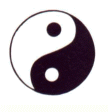Koua 12 - P’î, la décadence
AstroPalais astrologie chinoise, yi king, feng shui :: L'Etude du Yi-King (Yi jing) :: Lecture Yi King Richard Wilhelm traduit Perrot (Yi jing commentaire Ta Tchouan) :: I-Ching oneline livre texte occidental Charles de Harlez et James Legge
Page 1 sur 1
02042020

 Koua 12 - P’î, la décadence
Koua 12 - P’î, la décadence
P’ī désigne le méchant. Quand p’ī domine, le ciel et la terre sont sans rapport, les êtres ne se produisent pas. Quand le haut et le bas sont désunis, l’empire est sans gouvernement digne de ce nom.
TEXTE II
1. Les plantes dont les racines sont entremêlées (résistent et) ne peuvent être arrachées l’une sans l’autre. (Voir Koua 11, texte II, I). [Ceci concerne les princes. Com. II.]
2. Si par la patience et la constance l’homme vulgaire même réussit, l’homme supérieur ne le pourrait-il pas ? [Il ne troublera pas le peuple. Com. II.]
3. La patience fait avancer. [Mais il ne convient pas que l’on avance en dignité, uniquement parce qu’on supporte patiemment les oppositions et méchancetés. Com. II.]
4. Quand on a pour soi le décret du ciel, on réussira certainement ; les champs mis en ordre prospéreront (malgré les oppositions, etc). [Les désirs s’accompliront. Com. II.]
5. Heū-p’ī. Faisant cesser les oppositions méchantes, l’homme supérieur prospérera, ses amis seront comme entourés de branches luxuriantes de laurier. Le bonheur de l’homme supérieur est dans une fonction exercée avec justice et convenance.
6. Kīng-p’ī. Détruire, renverser les obstacles et nuisances. On fait succéder ainsi la joie, la satisfaction. Avant peine, après plaisir (dicton populaire). [Si les obstacles cessent, étant abattus comment pourraient-ils durer ? Com. II.]
Note. Nous avons ici un exemple d’obstacles, § 1 ; le moyen de les vaincre, §§ 2, 3, 4, et trois expressions dans lesquelles entre le mot p’ī, 2, 5, 6.

blog- V.I.P.
-

Koua 12 - P’î, la décadence :: Commentaires
J.Legge 12. Phi ( P'i ) ☰ ☷ In Phi there is the want of good understanding between the (different classes of) men, and its indication is unfavorable to the firm and correct course of the superior man. We see in it the great gone and the little come. 1. The first six, divided, suggests the idea of grass pulled up, and bringing with it other stalks with whose roots it is connected. With firm correctness (on the part of its subject), there will be good fortune and progress. 2. The second six, divided, shows its subject patient and obedient. To the small man (comporting himself so) there will be good fortune. If the great man (comport himself) as the distress and obstruction require, he will have success. 3. The third six, divided, shows its subject ashamed of the purpose folded (in his breast). 4. The fourth nine, undivided, shows its subject acting in accordance with the ordination (of Heaven), and committing no error. His companions will come and share in his happiness. 5. In the fifth nine, undivided, we see him who brings the distress and obstruction to a close,-the great man and fortunate. (But let him say), 'We may perish! We may perish!' (so shall the state of things become firm, as if bound to a clump of bushy mulberry trees. 6. The sixth nine, undivided, shows the overthrow (and removal of) the condition of distress and obstruction. Before this there was that condition. Hereafter there will be joy. |  |
 Sujets similaires
Sujets similaires» Koua 30 - Lî, le feu
» Koua 42 - Yî, l’accroissement
» Koua 58 - Túi, la sérénité
» Koua 11 - T’ai, la paix
» Koua 27 - I, l’alimentation
» Koua 42 - Yî, l’accroissement
» Koua 58 - Túi, la sérénité
» Koua 11 - T’ai, la paix
» Koua 27 - I, l’alimentation
Permission de ce forum:
Vous ne pouvez pas répondre aux sujets dans ce forum
